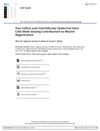 5 citations,
June 2015 in “Journal of dermatology”
5 citations,
June 2015 in “Journal of dermatology” A woman and her daughter had thallium poisoning from a herbal drink and rodenticide, causing hair loss and other symptoms.
 47 citations,
August 2005 in “Facial Plastic Surgery Clinics of North America”
47 citations,
August 2005 in “Facial Plastic Surgery Clinics of North America” Face-lifts can lead to complications like bleeding, nerve injury, skin death, hair loss, and rare infections, with careful surgery reducing risks.
 47 citations,
September 2015 in “Cell Cycle”
47 citations,
September 2015 in “Cell Cycle” Different skin stem cells help heal wounds, with hair follicle cells becoming more important over time.
 43 citations,
June 2012 in “Lasers in Medical Science”
43 citations,
June 2012 in “Lasers in Medical Science” Low-level laser treatment helped rats regrow hair faster after chemotherapy.
 24 citations,
January 2008 in “KARGER eBooks”
24 citations,
January 2008 in “KARGER eBooks” The document concludes that ongoing research using animal models is crucial for better understanding and treating Alopecia Areata.
 35 citations,
January 2012 in “The Journal of Sexual Medicine”
35 citations,
January 2012 in “The Journal of Sexual Medicine” Androgen Deprivation Therapy for prostate cancer often reduces sexual function but intermittent therapy may be more tolerable.
 2 citations,
September 2012 in “Actas Dermo-Sifiliográficas”
2 citations,
September 2012 in “Actas Dermo-Sifiliográficas” Societal pressure for the perfect body leads to health risks and disorders.
 378 citations,
November 2011 in “Human reproduction update”
378 citations,
November 2011 in “Human reproduction update” Experts recommend using evidence-based methods to diagnose and treat hirsutism, focusing on symptoms and underlying causes.
 10 citations,
November 2014 in “Sexual medicine reviews”
10 citations,
November 2014 in “Sexual medicine reviews” Effective, well-tolerated, and affordable treatments are needed for recurrent ischemic priapism.

The document is a detailed guide on skin conditions and treatments for dermatologists.
 1 citations,
June 2018 in “Advances in Cosmetic Surgery”
1 citations,
June 2018 in “Advances in Cosmetic Surgery” PRP might help with hair growth and skin rejuvenation, but more research is needed to prove its effectiveness.
 38 citations,
November 2012 in “Expert Opinion on Drug Safety”
38 citations,
November 2012 in “Expert Opinion on Drug Safety” Common acne treatments can cause various side effects, like skin irritation and more serious issues, but combination therapies are often more effective and better tolerated.
 16 citations,
June 2008 in “Springer eBooks”
16 citations,
June 2008 in “Springer eBooks” Over 50% of women over 50 experience hair loss, with minoxidil being the only proven effective treatment.
 42 citations,
November 2005 in “The journal of investigative dermatology. Symposium proceedings/The Journal of investigative dermatology symposium proceedings”
42 citations,
November 2005 in “The journal of investigative dermatology. Symposium proceedings/The Journal of investigative dermatology symposium proceedings” New hair products are being developed to keep hair and scalp healthy for everyone.
 43 citations,
July 2014 in “Experimental Dermatology”
43 citations,
July 2014 in “Experimental Dermatology” Hair follicles can help wounds heal faster and this knowledge could be used to treat chronic skin ulcers, with a potential use of a special stem cell hydrogel to enhance healing.
 41 citations,
April 2010 in “Gender Medicine”
41 citations,
April 2010 in “Gender Medicine” The conclusion is that hirsutism should be diagnosed and treated because it affects quality of life and may signal other health problems.
 4 citations,
May 2018 in “Journal of Neuro-Ophthalmology”
4 citations,
May 2018 in “Journal of Neuro-Ophthalmology” New treatments for relapsing multiple sclerosis are more effective and convenient but have higher risks of serious side effects.
 27 citations,
February 2017 in “Clinical, Cosmetic and Investigational Dermatology”
27 citations,
February 2017 in “Clinical, Cosmetic and Investigational Dermatology” New compounds were found to help increase hair growth and decrease hair loss.
 5 citations,
January 2020 in “Skin Research and Technology”
5 citations,
January 2020 in “Skin Research and Technology” Minoxidil 5% works better than 2% for hair growth in male-patterned hair loss.
3 citations,
February 2015 in “Mechanisms of development” Hormones and stretching both needed for nipple area skin growth in mice.
 66 citations,
December 2013 in “Nature Cell Biology”
66 citations,
December 2013 in “Nature Cell Biology” Inactive hair follicle stem cells help prevent skin cancer.
December 2022 in “Biochemical and Biophysical Research Communications” HtrA2 activity is crucial for normal hair growth by regulating fat cell development.
 101 citations,
March 2019 in “Cell Stem Cell”
101 citations,
March 2019 in “Cell Stem Cell” Certain immune cells in the skin release a protein that stops hair growth by keeping hair stem cells inactive.
 7 citations,
October 2000 in “Allergo Journal”
7 citations,
October 2000 in “Allergo Journal” Stress may affect hair growth by influencing hair follicle development and could contribute to hair loss.
 January 2024 in “Turkiye Klinikleri Journal of Dermatology”
January 2024 in “Turkiye Klinikleri Journal of Dermatology” Microneedling shows promise for hair loss but needs more research.
 10 citations,
January 2013 in “Journal of The European Academy of Dermatology and Venereology”
10 citations,
January 2013 in “Journal of The European Academy of Dermatology and Venereology” The home-use IPL device effectively reduced hair and delayed its regrowth after six months of use, with users happy and no negative side effects.
 6 citations,
October 2018 in “Dermatologic Surgery”
6 citations,
October 2018 in “Dermatologic Surgery” PRP therapy helps slow hair loss and increases hair thickness.
 35 citations,
March 2007 in “Skin Research and Technology”
35 citations,
March 2007 in “Skin Research and Technology” The conclusion is that exogen is a unique hair cycle phase and the new sampling method specifically targets this stage, which may help in future hair loss research.
 7 citations,
July 2019 in “International Journal of Molecular Sciences”
7 citations,
July 2019 in “International Journal of Molecular Sciences” PGA-4HGF may help treat hair loss by activating hair growth pathways and extending the hair growth phase.
 113 citations,
November 2017 in “Scientific Reports”
113 citations,
November 2017 in “Scientific Reports” Tiny particles from stem cells help activate hair growth cells and encourage hair growth in mice without being toxic.




























